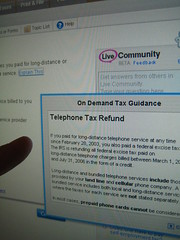
-Thomas Jefferson

-Thomas Jefferson

 Quote of the Week:
Quote of the Week:"The Congress will push me to raise taxes, and I'll say no, and they'll push and I'll say no, and they'll push again. And all I can say to them is read my lips: No New Taxes."
 Understated business income...the IRS says this is becoming more and more prevalent especially in small businesses. Are more and more small business owners trying to cheat the IRS out of tax dollars? The IRS thinks it is more likely to be the lack of knowledge on the part of small business owners of just how to calculate and document gross business income. Here are some helpful tips from the IRS to help out those who struggle with this on their tax returns.
Understated business income...the IRS says this is becoming more and more prevalent especially in small businesses. Are more and more small business owners trying to cheat the IRS out of tax dollars? The IRS thinks it is more likely to be the lack of knowledge on the part of small business owners of just how to calculate and document gross business income. Here are some helpful tips from the IRS to help out those who struggle with this on their tax returns.I hope this helps you in your search but keep in mind...this is something in my opinion the average taxpayer cannot handle themselves. Make sure you get the right help with your tax situation and hire a professional tax resolution company.
"Friends and neighbors complain that taxes are indeed very heavy, and if those laid on by the government were the only ones we had to pay we might the more easily discharge them; but we have many others, and much more grievous to some of us. We are taxed twice as much by our idleness, three times as much by our pride, and four times as much by our folly."
-Benjamin Franklin

If you do not file your returns you can incur failure to file penalties, forfeit tax refunds, lose your Earned Income Tax Credit, and open yourself up to criminal charges for failure to file.
The bottom line is: make sure you file your returns. Even if you DO NOT have the money to pay what you owe the IRS you still need to file the returns. For more information, please consult a tax professional.

Generally, the activity in considered a business if it has produced a profit in three of the last five years including the most recent year. Deductions for both business and hobby income are allowed but you must first determine whether your income is from a business or a hobby in order to follow the correct procedures for taking these deductions.
The IRS is not out to spoil your fun, but if these activities produce a profit every year or so you may want to determine whether or not you are required to pay taxes on that money. Don't find yourself behind the "eight-ball" with the IRS who may tell you you owe them taxes on your unreported income. This can become a mess and hard to provide proper documentation leaving you with an unexpected tax liability.
Points that do not meet these standards are not wasted money. Most are very necessary to the process of obtaining a mortgage loan from any financial institution. However, if the y do not fit the above requirements - all is not lost. You can deduct them over the life of the loan. Simply total the points and divide them by the number of payments required within the term of the loan and then deduct the points on your annual tax returns (on a Schedule A with your 1040 return) by how many payments were made in that year.
So don't worry you were charged too much...it just gives you a larger deduction. This should make everyone feel better. Well maybe not but anytime we can write off expenses on a tax return is helpful.
 Congratulations on your new job...you even get to move to a new city...you could qualify for a tax deduction from your moving expenses. If you have recently moved to a new city for a new job or because your current company has moved it's operations you may qualify for a tax break on your moving expenses. The main factors are how far you moved and how much time you spend on the job. If it is a short-time or part time job or if the move is relatively local you may not qualify.
Congratulations on your new job...you even get to move to a new city...you could qualify for a tax deduction from your moving expenses. If you have recently moved to a new city for a new job or because your current company has moved it's operations you may qualify for a tax break on your moving expenses. The main factors are how far you moved and how much time you spend on the job. If it is a short-time or part time job or if the move is relatively local you may not qualify. Have you recently donated money or items to a local charity in order to help someone less fortunate than yourself? Don't leave money on the table when you can take a tax deduction for such activity. Just make sure you have the required documentation in order to back up the deduction on your return. The IRS has become more strict on this since January of 2007 due to the Pension Protection Act of 2006 so make sure you understand the guidelines and follow the rules. This will save you a lot of time and money by taking deductions the right way.
Have you recently donated money or items to a local charity in order to help someone less fortunate than yourself? Don't leave money on the table when you can take a tax deduction for such activity. Just make sure you have the required documentation in order to back up the deduction on your return. The IRS has become more strict on this since January of 2007 due to the Pension Protection Act of 2006 so make sure you understand the guidelines and follow the rules. This will save you a lot of time and money by taking deductions the right way.If you need further information or help a good resource is IRS publication 526. As always, make sure you take advantage of the tax credits you are entitled to but make sure you follow the proper procedures. If you don't you can leave yourself open to filing an improper return and fall subject to penalties and interest. If this happens you can always obtain the services of a professional tax resolution company to rectify the situation. However, if you follow the rules on the initial return this will help you to avoid an unpleasant situation all together.
 The recently enacted Housing and Economic Recovery Act of 2008 has created a tax credit that all "First Time Homebuyers" should plan on taking advantage of. This credit applies to all homes purchased after April 8, 2008 and before July 1, 2009 and can reduce a taxpayer's tax bill or increase their refund dollar for dollar. This credit will even be paid out to eligible taxpayers even if they owe no tax or the or the credit is more than the tax they owe. So how much is this credit?
The recently enacted Housing and Economic Recovery Act of 2008 has created a tax credit that all "First Time Homebuyers" should plan on taking advantage of. This credit applies to all homes purchased after April 8, 2008 and before July 1, 2009 and can reduce a taxpayer's tax bill or increase their refund dollar for dollar. This credit will even be paid out to eligible taxpayers even if they owe no tax or the or the credit is more than the tax they owe. So how much is this credit? So you did what millions of Americans have done for years and visited a local tax preparer firm or CPA to have your annual tax returns prepared. This made you feel good that your tax returns were completed and done accurately by someone who knows how to correctly prepare returns for the IRS. But did they actually prepare them correctly and who will be liable if they make a mistake?
So you did what millions of Americans have done for years and visited a local tax preparer firm or CPA to have your annual tax returns prepared. This made you feel good that your tax returns were completed and done accurately by someone who knows how to correctly prepare returns for the IRS. But did they actually prepare them correctly and who will be liable if they make a mistake? The Internal Revenue Service has made an effort to fill positions inside the IRS with military veterans from our armed forces. This push to target veterans is mainly due to their training and capability to handle highly skilled positions inside the IRS. On September 4, 2008 the IRS announced that they have met their goal in hiring 1,000 military veterans in this fiscal year and will continue to focus hiring efforts within this valuable group of men and women. The fiscal year, which ends on September 30, 2008 has seen 1,052 hirings of such veterans.
The Internal Revenue Service has made an effort to fill positions inside the IRS with military veterans from our armed forces. This push to target veterans is mainly due to their training and capability to handle highly skilled positions inside the IRS. On September 4, 2008 the IRS announced that they have met their goal in hiring 1,000 military veterans in this fiscal year and will continue to focus hiring efforts within this valuable group of men and women. The fiscal year, which ends on September 30, 2008 has seen 1,052 hirings of such veterans.You must file your 2007 tax return by October 15th in order to receive the stimulus check. The IRS has completed about 90 percent of the checks but will continue to process them until December 2008. The biggest error is not filing your return for the 2007 tax year but there is still time. If you want to know more information of how to receive one or when yours will be delivered you can find out through the IRS Website. You also want to keep in mind if you owe any money to the IRS from unpaid taxes this check will simply be applied to that past due balance. If this is the case make sure you are being proactive in getting your tax debts resolved.
 In the first three parts of this series we looked at some of the changes your business can go through without being required to file for a new Employer Identification Number (EIN). We also looked at what changes would require a new EIN if you operate your business as a Sole Proprietor or a Corporation. Now we will look at some changes that your business can go through that WILL require you to file for a new EIN if you operate your business as a Partnership.
In the first three parts of this series we looked at some of the changes your business can go through without being required to file for a new Employer Identification Number (EIN). We also looked at what changes would require a new EIN if you operate your business as a Sole Proprietor or a Corporation. Now we will look at some changes that your business can go through that WILL require you to file for a new EIN if you operate your business as a Partnership.
If you are a Partnership, you will need to file for a new EIN if any of the following relate to your business restructuring changes:
Make sure you are following the guidelines set forth by the IRS with regard to making sure your business changes don't interrupt your business. If you stay on top of this from the start it can save you a lot of time and money trying to correct the problem later.
 In the first two parts of this series we looked at some of the changes your business can go through without being required to file for a new Employer Identification Number (EIN). We also looked at some changes that would require you to file for a new EIN if you operate your business as a Sole Proprietorship. Now we will look at some changes that your business can go through that WILL require you to file for a new EIN if you are a Corporation.
In the first two parts of this series we looked at some of the changes your business can go through without being required to file for a new Employer Identification Number (EIN). We also looked at some changes that would require you to file for a new EIN if you operate your business as a Sole Proprietorship. Now we will look at some changes that your business can go through that WILL require you to file for a new EIN if you are a Corporation.Make sure you are following the guidelines set forth by the IRS with regard to making sure your business changes don't interrupt your business. If you stay on top of this from the start it can save you a lot of time and money trying to correct the problem later. Next week we will look at Partnerships and what restructuring aspects can affect your business.
 In the first part of this series we looked at some of the changes your business can go through without being required to file for a new Employer Identification Number (EIN). Now we will look at some changes that your business can go through that WILL require you to file for a new EIN.
In the first part of this series we looked at some of the changes your business can go through without being required to file for a new Employer Identification Number (EIN). Now we will look at some changes that your business can go through that WILL require you to file for a new EIN.Make sure you are following the guidelines set forth by the IRS with regard to making sure your business changes don't interrupt your business. If you stay on top of this from the start it can save you a lot of tie and money trying to correct the problem later. Next week we will look at Corporations and what restructuring aspects can affect your business.
 To say being in compliance with filing your tax returns is important is a gross understatement. A good number of taxpayers do not file returns for specific years because they owe money to the IRS and cannot afford to pay the balance due. While it is true that owing money to the IRS can be a very stressful and embarrassing experience -- you can find yourself in a much worse position by not filing the returns. You can be prosecuted criminally for unfiled returns as many people are finding out across the country. In 2007 there were 516 investigations initiated and 300 of these had prosecution recommended for not filing tax returns. Of the 300 cases recommended for prosecution, 278 were sentenced (an 80.6% incarceration rate) with the average time served being 38 months. That is over 3 years in a federal prison because someone decided they either willfully did not want to follow the laws regarding filing taxes or maybe they thought (as so many people do) they could not afford to pay the taxes so I will wait and file the returns when I can pay. Take my advice FILE YOUR TAX RETURNS!!! It is better to have the IRS forcing monthly payments on you in order to pay the balance of your tax liability over time than to actually "do time." Ask yourself - would I rather pay for 5-10 years or be in jail for 5-10 years? I think this is an obvious answer.
To say being in compliance with filing your tax returns is important is a gross understatement. A good number of taxpayers do not file returns for specific years because they owe money to the IRS and cannot afford to pay the balance due. While it is true that owing money to the IRS can be a very stressful and embarrassing experience -- you can find yourself in a much worse position by not filing the returns. You can be prosecuted criminally for unfiled returns as many people are finding out across the country. In 2007 there were 516 investigations initiated and 300 of these had prosecution recommended for not filing tax returns. Of the 300 cases recommended for prosecution, 278 were sentenced (an 80.6% incarceration rate) with the average time served being 38 months. That is over 3 years in a federal prison because someone decided they either willfully did not want to follow the laws regarding filing taxes or maybe they thought (as so many people do) they could not afford to pay the taxes so I will wait and file the returns when I can pay. Take my advice FILE YOUR TAX RETURNS!!! It is better to have the IRS forcing monthly payments on you in order to pay the balance of your tax liability over time than to actually "do time." Ask yourself - would I rather pay for 5-10 years or be in jail for 5-10 years? I think this is an obvious answer.These are a few examples taken from an article on the IRS website from the year 2007. You can view others from 2006, 2007 & 2008 for additional proof. If you are behind on your tax filings don't think the IRS doesn't know where to find you or they won't come after you for the money. Please seek professional help in order to get into compliance and resolve your debt in a manner that is financially beneficial to you before it is removed involuntarily without your best interest in mind.
 So your business is changing. Maybe you are undergoing a simple change in ownership. You may need a new Employer Identification Number (EIN). If you are looking to incorporate a sole proprietorship or form a partnership you MUST get a new EIN. However, if you only change the following aspects of your business you will not need a new EIN.
So your business is changing. Maybe you are undergoing a simple change in ownership. You may need a new Employer Identification Number (EIN). If you are looking to incorporate a sole proprietorship or form a partnership you MUST get a new EIN. However, if you only change the following aspects of your business you will not need a new EIN.Make sure you do your due diligence on this matter before you make any changes. Not filing for a new EIN if one is needed can lead to major complications later when filing your tax returns. In the second part of this article (next week) we will look at some of the specific changes in your business restructure that will require you to apply for a new EIN. If you find yourself in the situation where complications have come about for your business because you did not follow (or know about) the procedures you can get help from a certified tax resolution professional.
 Quote of the week:
Quote of the week: So you haven't filed your tax returns yet but you're not worried because the IRS owes you a refund. You can always go back and file to get your money when you need it right? WRONG! You do have the ability to file a late tax return and claim any refunds due to you from the IRS but pay attention: THERE IS A TIME LIMIT!
So you haven't filed your tax returns yet but you're not worried because the IRS owes you a refund. You can always go back and file to get your money when you need it right? WRONG! You do have the ability to file a late tax return and claim any refunds due to you from the IRS but pay attention: THERE IS A TIME LIMIT!If you can answer "yes" to any or all of the above questions you may be able to qualify for this unique designation. You will need to file a Form 8857 with the IRS to be granted a formal determination. One thing to keep in mind, however, you must have documented proof of the above factors. All of the above are hard to prove and if you filed your return for the year in question as "married and joint" you will have a hard time proving you are an innocent spouse. The obligation for accurate tax reporting ultimately comes down the taxpayer and once you sign your return you are responsible for the information on it.
 Tired of paying rising gas prices everywhere you go? Are you going through lifestyle changes in order to fight the rising cost of fuel? Is your business or job being suffocated by the financial crunch of keeping vehicles on the road in order to continue business as usual? There is some help on the horizon.
Tired of paying rising gas prices everywhere you go? Are you going through lifestyle changes in order to fight the rising cost of fuel? Is your business or job being suffocated by the financial crunch of keeping vehicles on the road in order to continue business as usual? There is some help on the horizon. After several notifications from the IRS, you receive a "CP 504" as a certified letter like the one shown in the picture above. This letter is not like the others you have received. This letter has "ATTENTION PLEASE" written all over it. First, it's delivered certified mail which is always an eye opener. Next, the letter serves to notify you that since the IRS has not received a response or payment for your back taxes (in spite of all the notices they sent you) they have decided to levy your paycheck. Since you decided not to send any money to the IRS they decided to help you out by saving you the cost of a stamp and remove it themselves. That way you don't have to mail them a check for up to 85% of your net paycheck each pay period.
After several notifications from the IRS, you receive a "CP 504" as a certified letter like the one shown in the picture above. This letter is not like the others you have received. This letter has "ATTENTION PLEASE" written all over it. First, it's delivered certified mail which is always an eye opener. Next, the letter serves to notify you that since the IRS has not received a response or payment for your back taxes (in spite of all the notices they sent you) they have decided to levy your paycheck. Since you decided not to send any money to the IRS they decided to help you out by saving you the cost of a stamp and remove it themselves. That way you don't have to mail them a check for up to 85% of your net paycheck each pay period.
 In the first three parts of this series on an Offer In Compromise (OIC) we have discussed some of the pitfalls and things to look out for when using this as a resolution. We have attempted to make you a little more aware and a little more educated on the process and what will be acceptable by the IRS. We also went over the first two areas where an OIC might be an option for taxpayers which are "Doubt as to Collectibility" and "Doubt as to Liability."
In the first three parts of this series on an Offer In Compromise (OIC) we have discussed some of the pitfalls and things to look out for when using this as a resolution. We have attempted to make you a little more aware and a little more educated on the process and what will be acceptable by the IRS. We also went over the first two areas where an OIC might be an option for taxpayers which are "Doubt as to Collectibility" and "Doubt as to Liability."
"Did you ever notice that when you put the words 'The' and 'IRS' together it spells THEIRS?"
-Author Unknown
 In the first two parts of this series we have taken an inside look at a program called an Offer In Compromise or OIC for short. This is advertised by many companies who offer "Pennies on the Dollar" settlements. Be very careful before you attempt this type of settlement or use a company who uses this as the primary way to resolve your tax debt.
In the first two parts of this series we have taken an inside look at a program called an Offer In Compromise or OIC for short. This is advertised by many companies who offer "Pennies on the Dollar" settlements. Be very careful before you attempt this type of settlement or use a company who uses this as the primary way to resolve your tax debt. 